Celebrating #WOYC24!
We celebrated #WOYC24 with an in-person event in Dayton and emails with activity ideas and community resources for each day of the week! We also received a mayoral proclamation!
Check out the pictures below and then take a look at the activity ideas and community resources for each day of the week!
April 8: Music Monday
Today is all about singing, dancing, and listening to music—all of which help children develop their language and early literacy skills while being actively engaged in movement.
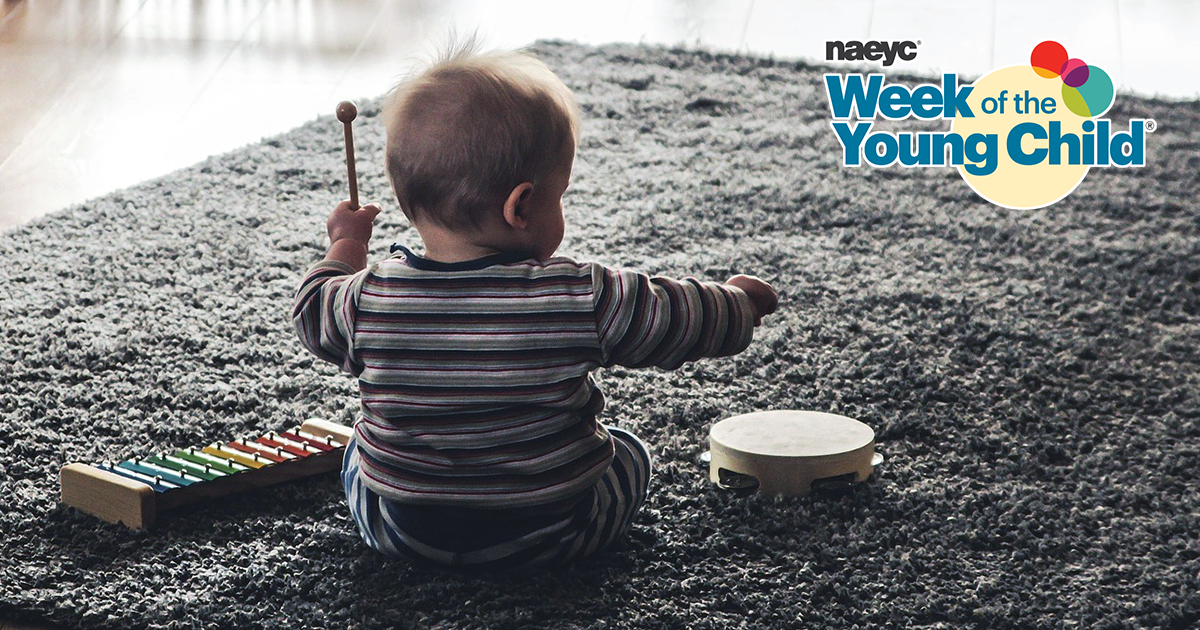
Inspiration from the Classroom
From Teaching Young Children, Winter 2023
8X. Using Music in Your Setting: Tips for the Nonmusician
Karen E. Goulandris
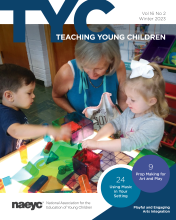
Music is an important part of early childhood settings. Whether singing songs, listening to recordings, or playing with instruments and rhythms, music brings joy. In addition, research continues to show its social, emotional, and cognitive benefits. You don’t need to be a musician to use music comfortably, confidently, and creatively with children. Here are eight ways to make it an integral part of your classroom.
For Families
Playing with Music at Home
Young children love to sing, make music, and move to the beat. They feel competent when they learn a new song, powerful when they pound a drum or shake a tambourine, and proud when they invent a new dance. As children explore and enjoy music, they can develop skills in math, literacy, and social studies. Teachers relate music to diverse subjects and your family can continue this learning at home.
to sing, make music, and move to the beat. They feel competent when they learn a new song, powerful when they pound a drum or shake a tambourine, and proud when they invent a new dance. As children explore and enjoy music, they can develop skills in math, literacy, and social studies. Teachers relate music to diverse subjects and your family can continue this learning at home.
April 9: Tasty Tuesday
This fun, food-themed day is about more than just cheese and crackers. Cooking together connects math with literacy skills, science, and more. With the rise in childhood obesity, you can encourage healthy nutrition and fitness habits at home and in the classroom.
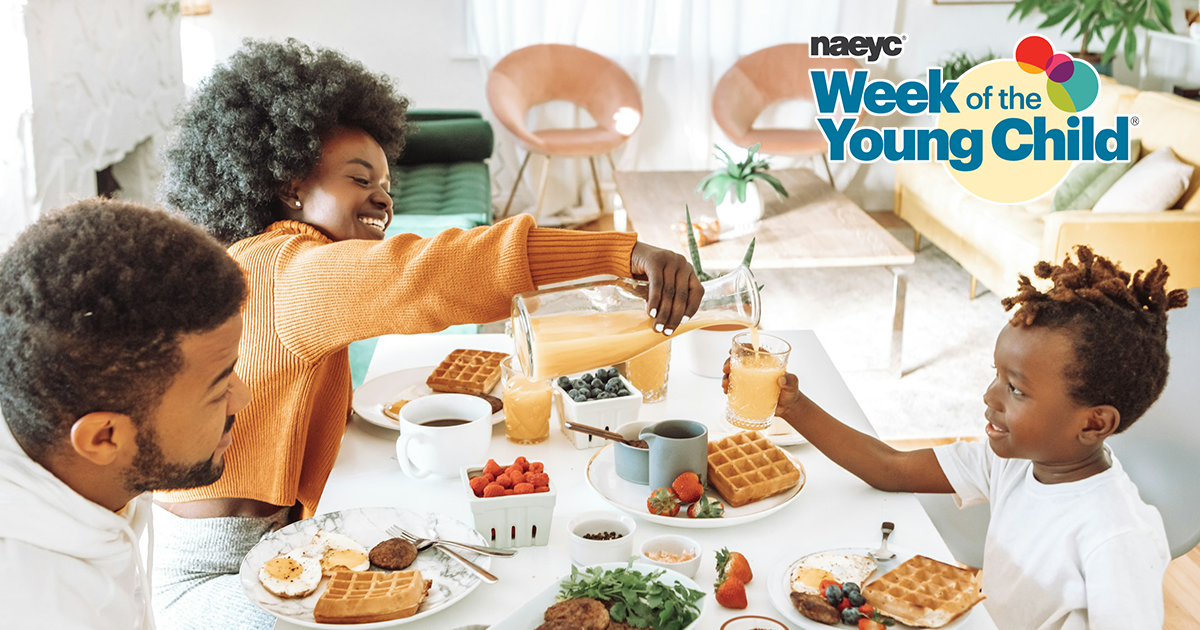
Tips for the Classroom and at Home
“I Helped Mama Too!” Cooking With a Tiny Helper
Julia Luckenbill

My 2-year-old loves to cook. In her classroom she is the first one to volunteer for a cooking activity asking, “Can I help you?” At home she enjoys looking at cookbooks and suggesting projects: “Can we make challah? Now?” The challenge is integrating her in a way that is helpful, as she is known to spill ingredients, taste everything, and leap in before adults are ready with a job for her.
Here are 10 tips we use in the classroom and at home to make cooking with toddlers easier for everyone.
For Families
From Teaching Young Children, Spring 2023
Message in a Backpack™
Supporting Healthy Eating Habits: Tips for Families
Monica Griffin
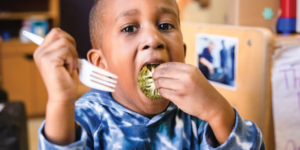
“How do I get my child to eat their vegetables?”
As a child nutrition expert with 13 years of experience working with families and early childhood programs, that’s the question I’m most often asked. Families know that healthy eating is important for their children’s developing bodies and minds, but how can they introduce new foods so that children will accept them?
April 10: Work Together Wednesday
When children build together they explore math and science concepts and develop their social and early literacy skills. Children can use any building material—from a fort of branches on the playground to a block city in the classroom, or a hideaway made from couch pillows at home.
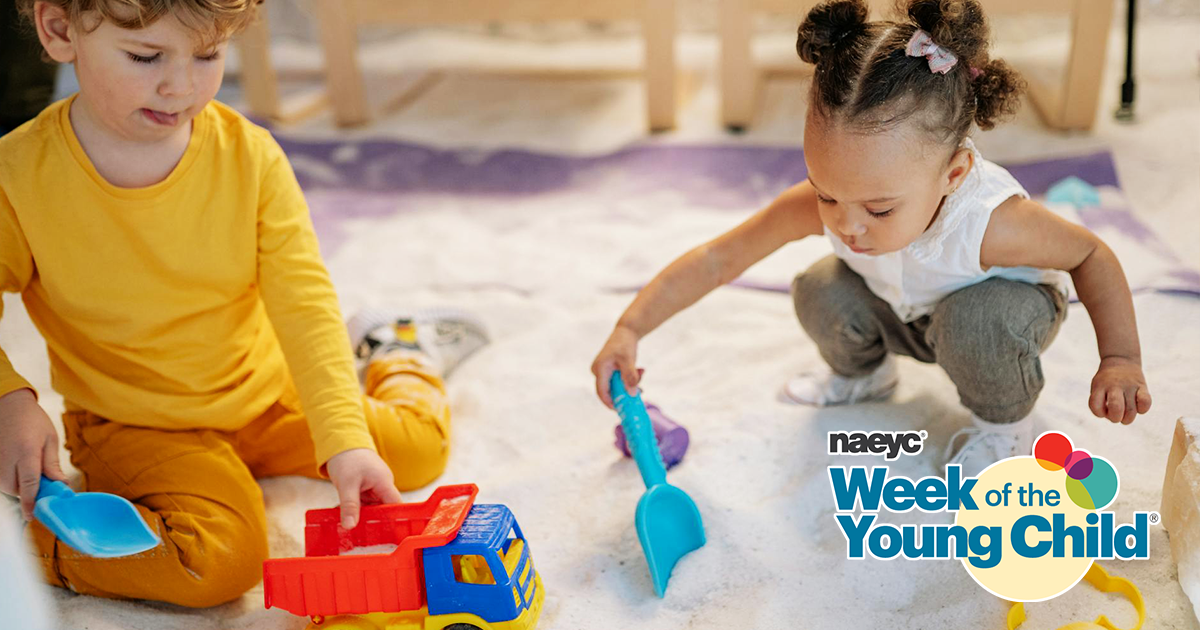
Inspiration from the Classroom
From Teaching Young Children, Spring 2022
Playing Around with Number Composition: Games, Stories, and Everyday Problem Solving in the Preschool Classroom
Alissa A. Lange, Hagit Mano, Sylwia Lech, and Irena Nayfeld
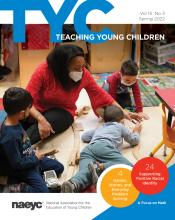
Five preschool children and their teacher, Sylwia, are galloping around two Hula Hoops placed in the center of the rug. They sing along to a familiar tune playing in the background. When Sylwia pauses the music, the children know to scatter and find a spot in one of the two hoops. This time, they all gather into one hoop.
The music starts again, sending the group galloping around once more. The music stops, and the teacher and children each step into a hoop. “Adrian,” Sylwia asks, “what combination did we make this time? How many do we have in each hoop?”
For Families
From Teaching Young Children, Summer 2022
Message in a Backpack™
Harnessing the Joy of Open-Ended Materials with Your Child
Jenna Valasek
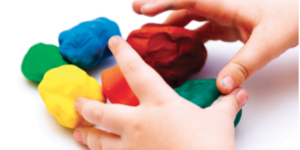 Playful learning doesn’t require the latest and greatest toys and technologies. Some of the most valuable learning materials are open-ended items that you probably have at home or can find at little to no cost. Blocks, paint, sand, water, playdough, and natural materials like twigs, flowers, and herbs lend themselves to playful learning and exploration.
Playful learning doesn’t require the latest and greatest toys and technologies. Some of the most valuable learning materials are open-ended items that you probably have at home or can find at little to no cost. Blocks, paint, sand, water, playdough, and natural materials like twigs, flowers, and herbs lend themselves to playful learning and exploration.
April 11: Artsy Thursday
Think, problem solve, create! Children develop creativity, social skills and fine motor skills with open-ended art projects where they can make choices, use their imaginations, and create with their hands. On Artsy Thursday, celebrate the joy and learning children experience when engaged in creative art making.
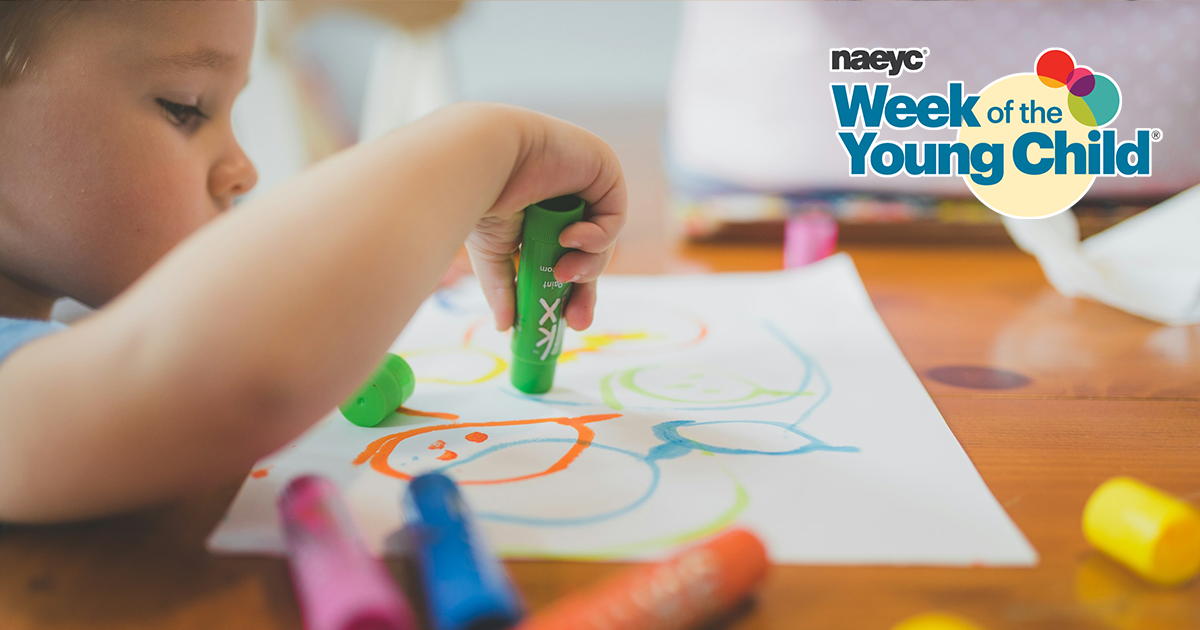
Inspiration from the Classroom
From Teaching Young Children, Winter 2023
What Will We Make? Using Process Art to Spark Preschoolers’ Development
Loretta Fernando-Smith
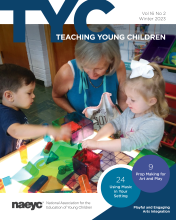 Most mornings, the 4- and 5-year-olds in Room 21 at Frankfurt International School in Germany enter their classroom to tables set with various art materials. At one, drawing papers atop placemats are surrounded by trays of watercolors, varying sizes of paint brushes, black permanent markers, and pots of water. A rectangular table stands in front of a shelf with clear containers holding collections of cardboard boxes, cylinders, colored scrap paper, glue, and wire. On yet another table, plasticine cubes of various colors await with old jam jars filled with wire, pipe cleaners, and beads.
Most mornings, the 4- and 5-year-olds in Room 21 at Frankfurt International School in Germany enter their classroom to tables set with various art materials. At one, drawing papers atop placemats are surrounded by trays of watercolors, varying sizes of paint brushes, black permanent markers, and pots of water. A rectangular table stands in front of a shelf with clear containers holding collections of cardboard boxes, cylinders, colored scrap paper, glue, and wire. On yet another table, plasticine cubes of various colors await with old jam jars filled with wire, pipe cleaners, and beads.
For Families
From Teaching Young Children, Winter 2023
Message in a Backpack™
Encouraging Process Art at Home: Reaping the Benefits of Joy and Making
Loretta Fernando-Smith
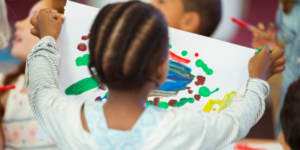 People often think about art as creating something beautiful—a replica Starry Night collage or a seasonal craft to serve as a gift. But when children engage in process art, they explore and experience materials without working toward a particular end product. In this case, going through the process of making art is more important than the results or outcomes.
People often think about art as creating something beautiful—a replica Starry Night collage or a seasonal craft to serve as a gift. But when children engage in process art, they explore and experience materials without working toward a particular end product. In this case, going through the process of making art is more important than the results or outcomes.
There are many benefits to be gained from process art. It can be playful and joyful, and it nurtures having an open mind, trying new things, and building curiosity and resilience. It also requires minimal adult preparation.
April 12: Family Friday
Engaging and celebrating families is at the heart of supporting our youngest learners. NAEYC applauds family members’ role as young children’s first and most important teachers.
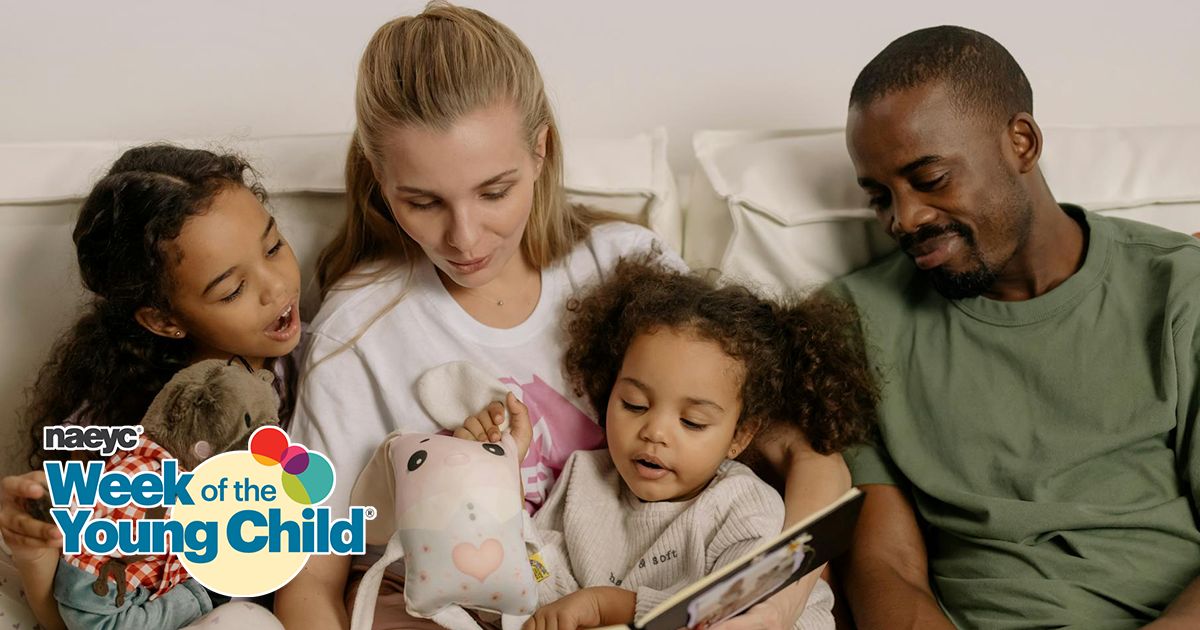
Inspiration from the Classroom
From Teaching Young Children, Winter 2022
Five Rs for Promoting Positive Family Engagement
Bweikia Foster Steen
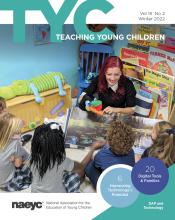 Developing positive partnerships with the families of the children you teach is one of your most important tasks as a teacher. It can also be among the scariest or the most challenging tasks! I offer five Rs—respect, responsiveness and reassurance, relationship, reciprocity, and reflection—to help you build trust and promote positive family engagement in your preschool classroom.
Developing positive partnerships with the families of the children you teach is one of your most important tasks as a teacher. It can also be among the scariest or the most challenging tasks! I offer five Rs—respect, responsiveness and reassurance, relationship, reciprocity, and reflection—to help you build trust and promote positive family engagement in your preschool classroom.
Inspiration from the Classroom
From Teaching Young Children, Fall 2021
Message in a Backpack™
Encouraging Your Child Through Risks During Play
Ron Grady
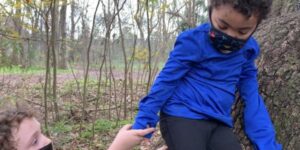 Outdoor, nature-based play like climbing, balancing, and playing big body games (such as tag) is essential for children’s growth and learning. Yet this kind of “risky play” can bring questions and worries: Should my child climb a tree? Should they go that high? Should they jump or swing from that branch? What if they trip? What if they get stuck? What if they fall?
Outdoor, nature-based play like climbing, balancing, and playing big body games (such as tag) is essential for children’s growth and learning. Yet this kind of “risky play” can bring questions and worries: Should my child climb a tree? Should they go that high? Should they jump or swing from that branch? What if they trip? What if they get stuck? What if they fall?
